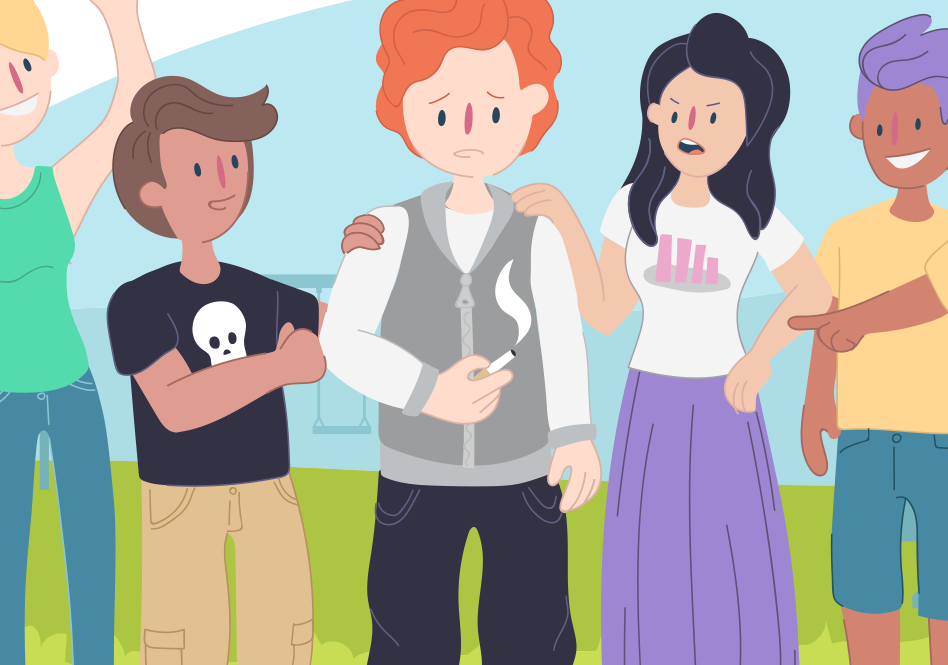Helping kids and teens deal with peer pressure
Many parents worry about the negative impacts of peer pressure. We’ve got tips to help you guide your kids through it.

Peer pressure is common – it’s how you deal with it that matters
Everybody experiences the need to fit in and belong. This is especially important for children and young people.
Growing up means being exposed to pressures from friends and people inside and outside the family. Peer pressure can come from friendship groups, classmates, teammates or even older siblings.
For kids and teens, it’s usually very important to their sense of belonging and acceptance that they adopt some of the beliefs and behaviours of their friendship group. This is generally what people mean when they talk about ‘peer pressure’.
Peer pressure can be subtle and kids may express it through dressing, talking or behaving in a way that their friends think is acceptable. At other times, peer pressure is more direct and can involve kids feeling pressured into doing things they don’t want to do.
Positive peers
While most parents worry about the negative impact of peer pressure, it’s also good to remember that sometimes peer groups can have a positive impact on kids too. Through their friendships, kids can learn to:
Things you might worry about
There are times when you might notice your kids are being influenced by friends or peers in a negative way. There are some common worries and concerns that parents have when it comes to peer pressure.
They may worry their kids will:
Adopt a negative attitude
Lie, cheat or be deceitful
Change the way they dress or act
Have sex or be exposed to pornography
Experiment with drugs, cigarettes or alcohol
Steal or take part in other illegal activities
Do risky things or be exposed to risky situations
Stop being friends with peers you liked and approved of
There are moments when you might wonder which direction to take or how to handle the situation. Just remember there is support out there. Parentline is available in every state and territory.
Peer pressure can be hard to stand up to
Some kids can change and adopt news ways of behaving fairly quickly, while other kids might not change at all or only a little.
Some parents might wonder why this is happening to their child. What drives kids to go along with peer pressure?
Every child is different and the only way to know for sure is to ask them directly. However, there are some common underlying reasons why kids might give into peer pressure:
Strengthen the relationship with your kids
Having a strong, positive relationship with your kids helps you get through tough times together
Work at creating a strong bond with your child. Talk to them about their day and understand their routines and habits. By forming this relationship early on, it will provide a foundation for difficult conversations later.
Check out our topics on Building Healthy Family Relationships, Communication Tips, and Building Respectful Relationships for more information and strategies on strengthening your relationships.
What parents can do
Here are some ideas on how to tackle the issue of peer pressure with your kids. These are long-term strategies you can work at implementing at any time.
Keep in mind that each child and family is different so you may need to try different ways of putting these strategies in place. It may take some trial and error to figure out what works for your family. Talk to a friend, counsellor or support person if you need more help.
- Keep the lines of communication open. Let your kids know you’re always there to listen and talk to them about what’s happening in their life.
- Build up their confidence by trusting them to make good choices. Show them you have faith in their ability to make decisions.
- Show interest in getting to know their friends. Invite their friends over for dinner or just to hang out with your kids in your own home.
- Encourage your kids to do a range of activities and meet new people. Having friends in different settings can take the pressure off trying to fit in with a single friendship group.
- Try to keep an open mind. Let them know they can talk to you about things even when it might make you uncomfortable or it challenges you.
- Understand the strong pull your kids have toward spending time with their peers. If you can, allow them enough freedom to explore these friendships and try not to take it personally when they don’t agree with you about their friends.
- Pick your battles. Don’t stress over the small things like changes in the way they dress but take the time to talk about the big things that pose the most risks. By not focusing on the small stuff they might be more open to hearing about the big stuff.
- Teach kids about peer pressure so they are aware of what’s happening to them. Help them understand what peer pressure looks like and how to handle it in the moment. Take a look at our Peer Pressure and Fitting In topic for Teens and the Wanting To Fit In topic for Kids.
- Help them find balance in their life. Teach them how having friends is important but so is being true to oneself and expressing your own individuality.
- Set realistic boundaries with your kids. For example, if you can’t stop them being friends with people you don’t approve of, you could try negotiating where and when they hang out with their new friends.
- Come up with a plan so they can get out of tricky situations. For example, before attending a party, you both agree that they will text you to pick them up if they feel uncomfortable or want to leave.
Having conversations about peer pressure
There may be some uncomfortable conversations to be had with your kids. If you can find a good time to sit down in private with your kids, here are some topics you may find helpful to talk about with them:
Be open about your own experiences with peer pressure. Share how you handled it, what you did well, plus any mistakes you made and what you learnt from it.
Teach them how to say no. Find the ability to say no to external pressures yourself and model the behaviour for them. Talk to your kids about how you did that.
Talk to them about how the decisions they make now might impact them in the future. A gentle word or two about the future risks can be enough. If you try to be too demanding or controlling you may push them away and close down the communication.
Discuss the risks involved in underage drinking, smoking cigarettes, unplanned or unprotected sex and using drugs.
You may not have all the answers and that’s ok
It can take more than one conversation with your child to get things on track
It can be tough guiding your child in positive ways and helping them cope with peer pressure. Remember, you and your family are not alone!
For parenting support you can try talking to a counsellor at Parentline in your state or territory.
If your child needs some extra support with friendships or peer pressure they can call Kids Helpline anytime, for any reason on 1800 55 1800. They can also start a WebChat or email a counsellor!
Check these out too:
Risk taking and teens
Testing boundaries and taking some risks is a healthy way for your ...
READ MEKeeping kids safe at parties
You might worry about what your teen is exposed to when they ...
READ MEEmpowering young people to ask for help
Being able to ask for help when you need it is an ...
READ MEBullying at school
When bullying happens at school, it’s hard to know how to ...
READ METalking helps! We’re here for your kids.
No problem is too big or too small.
We're here 24 hours a day, 7 days a week






